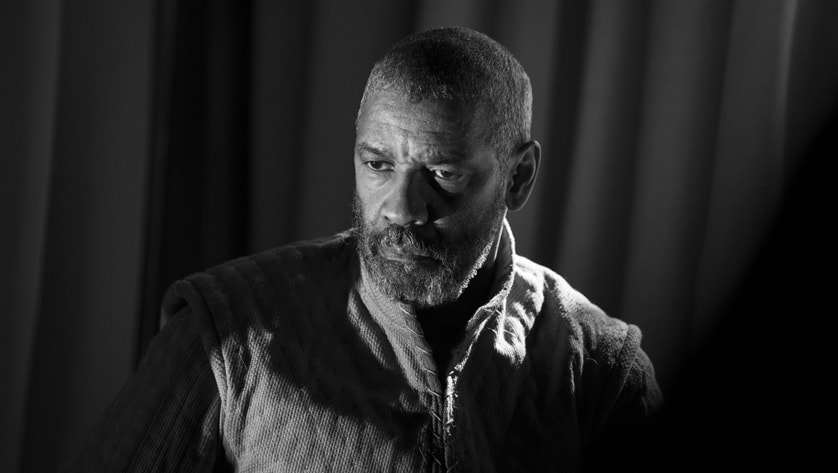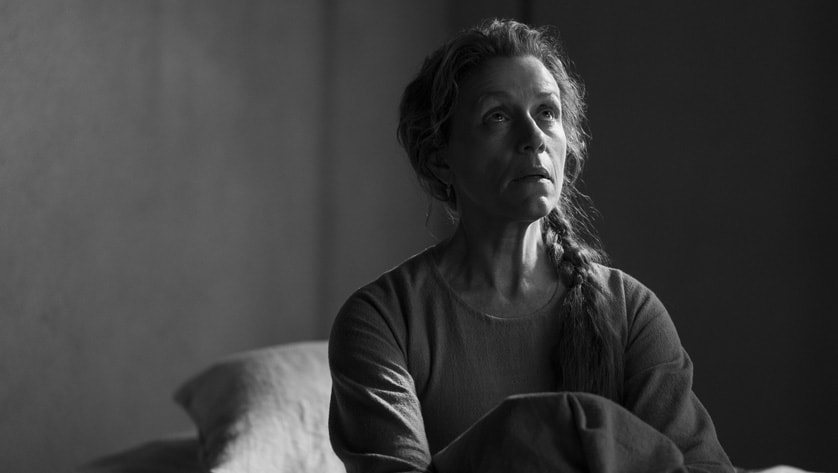The decision to open The Tragedy of Macbeth in theaters on Christmas Day—like releasing a murder of anxious, captive crows into the sky—has to be one of the most perverse marketing strategies of recent years. It’s also brilliant and perfect, if not from a moneymaking perspective, then definitely from an artistic one. Audiences will be able to watch this movie on Apple TV+ a few weeks after its theatrical release; if that’s the only way for you to see it, then by all means do so. But to see this movie in the theater is a special, shuddering pleasure, a tilting-at-windmills affirmation of what movies, seen big, can mean. This is movie as black magic. To give yourself over to it feels a little dangerous. It also feels great.
Anyone who wonders why Joel Coen would care to adapt one of Shakespeare’s best known but also bleakest plays probably hasn’t seen many Coen brothers movies. On the surface, the material’s jaundiced view of human nature seems perfect for him. And yet the play’s sense of what motivates people to do terrible things isn’t as simplistic as all that, and Coen—who wrote this treatment for the screen—knows it. The casting of Denzel Washington and Frances McDormand, as the brave Scottish general and his wife whose dreams of becoming royalty turn them murderous, shifts the material into a different shard of light. When these characters are played by actors who are past middle age—almost past the point where they could derive much enjoyment from power, let alone riches—their desperation becomes the point. This is their last stop. They don’t want to die as also-rans, content to wear a halo of coulda-been-a-contender nobility. Horrible, fascinating, scarily human, they’re like a senior-fare Bonnie and Clyde, grabbing at whatever it takes to have their blaze of glory.

The movie opens with swirling crows in an alabaster-gray sky—the picture’s elegant black-and-white cinematography is by Bruno Delbonnel, and it has the unearthly beauty of ancient bones bleached by time. Denzel’s Macbeth and his right-hand-man Banquo (Bertie Carvel) stride through a sandy, lunar-looking landscape, discussing a recent victorious battle, when they stumble upon a vision, a creature to whom we’ve already been introduced. The story’s three witches are played here by one captivating performer, Kathryn Hunter, as a twisted, double-jointed gnome who can grip a sailor’s severed thumb—or what have you—between her prehensile toes. She speaks in a croaking whisper, a voice that seems to have been rubbed raw by centuries’ worth of sand pouring through an hourglass. Her early appearance in the film paradoxically stops it and kicks it into high gear. She’s a one-person point of no return.
Coen shows her to us, and to Macbeth, in a triplicate mirage. Her prophesy—that Macbeth will become king—is one he gradually takes to heart, writing of it in a letter he sends home to his wife, McDormand’s Lady Macbeth. She reads it eagerly as she strides through a minimalist corridor flanked by tall candlesticks, one of which provides the flame she uses to burn the missive and send it through a window, flying into the night like a misbegotten planet. Her future is so bright it’s already on fire.

Duncan, the doomed king, is played by Brendan Gleeson, with squinty gravitas; Corey Hawkins is his loyal thane Macduff, the trustworthy soul who plays a pivotal role in the finale—but before that, he has a fine scene in which he captures the prickly beginnings of grief. The pleasures of The Tragedy of Macbeth are chilly ones: There’s a truly horrifying scene alluding to, if not overtly showing, the murder of Macduff’s children. McDormand makes a sturdy, intriguing Lady Macbeth: With her coiled coif and upright posture, she has the look of one of those women who retires to Santa Fe to weave wall hangings, and this is part of what makes her motives so ghastly—at an age when most aspiring Scottish queens would be winding down, she’s just revving up. And Washington is a phenomenal Macbeth, dithery and stammering at times, unnervingly resolute at others. Just as he’s reached role-model grandpa age, he’s a man on the wrong track, though his energy is formidable: he strides through the corridors of his castle with the bullish physicality of a high-school athlete, the panels of his regal leather tunic flaring around his legs like the gills of a fighting fish.
Read more reviews by Stephanie Zacharek
The costumes here—by Mary Zophres—are so extraordinary they could be the foundation of a new product line. The tiny points of embroidery at the neck of Lady Macbeth’s linen sheath, the soft leather boots worn by the men, formed and shaped from just a few pieces of leather: Macbethwear, anyone? But then, the whole movie has the weighty feel of a mantle that settles heavily about the shoulders—at the finish, you may not be sure what you just saw, but you know you sure as hell saw something. Though actors often clamor to perform Macbeth, I know very few people who would name it as their favorite play. Perhaps it’s too stark, too arrowlike in its single-mindedness, to be a favorite. But I could see The Tragedy of Macbeth becoming a favorite Shakespearean film adaptation, for those who rank such things. Watching it, I felt as if I were part of the audience seeing the play for the first time, from the pit. I flinched more than once; at one point a weird, strangled cry got stuck in my throat. At the end, I checked the bottom of my shoes for straw and mud, and was surprised to find neither.
More Must-Reads from TIME
- Donald Trump Is TIME's 2024 Person of the Year
- Why We Chose Trump as Person of the Year
- Is Intermittent Fasting Good or Bad for You?
- The 100 Must-Read Books of 2024
- The 20 Best Christmas TV Episodes
- Column: If Optimism Feels Ridiculous Now, Try Hope
- The Future of Climate Action Is Trade Policy
- Merle Bombardieri Is Helping People Make the Baby Decision
Contact us at letters@time.com